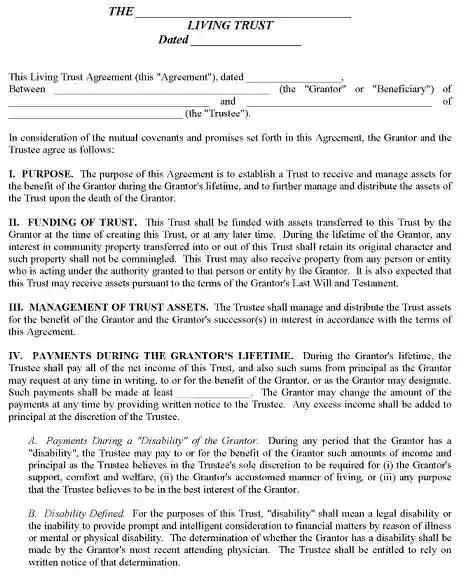We offer the most common types of Trust Forms. There are several types of trusts. The most common is a joint revocable trust established by parents or grandparents. Trusts can be revocable or irrevocable. There are several other types of trusts, most designed to reduce the financial impact of income taxes. These include the Asset Protection Trust, Charitable Trust, Constructive Trust, Special Needs Trust, Spendthrift Trust, and the Tax Pass-By Trust.
We do not offer legal forms for any type of business trust. Our forms consist of personal trusts commonly executed by families.
All of our trust forms are available in Microsoft Word and PDF. You can print the form and fill in the blanks. You can also edit or customize the form using an appropriate document editing software such as Word or Adobe Acrobat.
Example of a Living Trust Form

Printable Trust Forms By Type
PRINTABLE DECLARATION OF TRUST FORMS BY STATE
PRINTABLE JOINT LIVING TRUST FORMS BY STATE
PRINTABLE LIVING TRUST AMENDMENT FORMS BY STATE
PRINTABLE REVOCABLE LIVING TRUST FORMS BY STATE
PRINTABLE REVOCATION OF LIVING TRUST FORMS BY STATE
PRINTABLE REVOCATION OF TRUST FORMS BY STATE
Printable Trust Forms By State
Printable Arkansas Trust Forms
Printable California Trust Forms
Printable Colorado Trust Forms
Printable Connecticut Trust Forms
Printable Delaware Trust Forms
Printable Illinois Trust Forms
Printable Kentucky Trust Forms
Printable Louisiana Trust Forms
Printable Maryland Trust Forms
Printable Massachusetts Trust Forms
Printable Michigan Trust Forms
Printable Minnesota Trust Forms
Printable Mississippi Trust Forms
Printable Missouri Trust Forms
Printable Nebraska Trust Forms
Printable New Hampshire Trust Forms
Printable New Jersey Trust Forms
Printable New Mexico Trust Forms
Printable New York Trust Forms
Printable North Carolina Trust Forms
Printable North Dakota Trust Forms
Printable Oklahoma Trust Forms
Printable Pennsylvania Trust Forms
Printable Rhode Island Trust Forms
Printable South Carolina Trust Forms
Printable South Dakota Trust Forms
Printable Tennessee Trust Forms
Printable Virginia Trust Forms
Printable Washington Trust Forms
Printable West Virginia Trust Forms
Printable Wisconsin Trust Forms
Revocable Trusts
Revocable trusts are also known as living trusts. A revocable trust allows the transfer of assets without probate, yet they allow you to retain control of the assets during your lifetime. A revocable trust is flexible and can be dissolved at any time. A revocable trust typically becomes irrevocable when the grantor dies.
Irrevocable Trusts
Irrevocable trusts typically transfer assets out of your estate and often avoid estate taxes and probate. An irrevocable trust cannot be changed by the grantor after it has been executed. Once you execute an irrevocable trust, you lose control of the assets and cannot change any terms or decide to dissolve the trust.
Joint Trusts
Joint trusts are typically set up by a married couple. Unless specified in the trust agreement, a joint trust is revocable. Some agreements state that the trust can be revoked only by the consent of both spouses. This is a legal protection to cover both spouses in the event of a divorce. Grandparents often execute joint trusts to benefit their grandchildren. Often upon the death of both grandparents, the remainder of the trust is either given to the grandchildren if they are of age or remains in the trust until the grandchildren reach the age specified in the trust agreement.
Common Questions About Trusts
These completely free trust forms along with most other legal records presented free on this web page are supplied “as is” without intended or implied warranties. This also includes, yet is not limited to, warranty of merchantability or fitness for any type of kind of certain use.
These completely free trust forms were not generated by a legal professional or law practice. If the document is legally appropriate for your criteria, it is your responsibility to determine. If required, you have to likewise make sure that the form is properly filled out as well as likewise witnessed.
As a visitor of this website, you assume all culpability together with answerability for executing as well as using the trust forms. We do not assume any kind of legal liability or commitment for the accuracy and reliability or functionality of the legal instruments.
By saving, printing, or using any of the trust forms, you recognize that we will not be held accountable for injuries or losses, whether absolute or indirect, deriving from the loss of use or loss of revenues arising from the application or implementation of the legal forms or the form templates supplied on this site.
Will Forms — Trust Forms — Search For Legal Forms — Printable Legal Forms — Bill of Sale Forms — Personal Legal Forms — Business Legal Forms